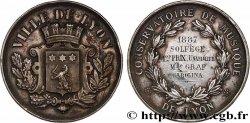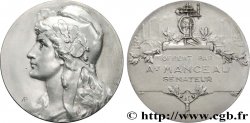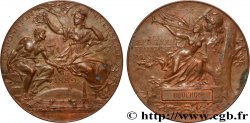E-auction 253-177161 - fme_370757 - III REPUBLIC Médaille de concours aux armes de Jacques Coeur
You must signin and be an approved bidder to bid, LOGIN TO BID. Accounts are subject to approval and the approval process takes place within 48 hours. Do not wait until the day a sale closes to register. Clicking on « bid » constitutes acceptance of the terms of use of cgb.fr private e-auctions.
Bids must be placed in whole Euro amounts only. The sale will start closing at the time stated on the item description; any bids received at the site after the closing time will not be executed. Transmission times may vary and bids could be rejected if you wait until the last second. For further information ckeck the E-auctions F.A.Q.
NO BUYER'S FEE.
NO BUYER'S FEE.
| Estimate : | 50 € |
| Price : | 14 € |
| Maximum bid : | 32 € |
| End of the sale : | 19 February 2018 19:08:00 |
| bidders : | 5 bidders |
Type : Médaille de concours aux armes de Jacques Coeur
Date: 1879
Mint name / Town : 18 - Bourges
Metal : brass
Diameter : 32 mm
Orientation dies : 12 h.
Weight : 9,5 g.
Edge : lisse
Coments on the condition:
Médaille avec sa patine d’usage, de 37 mm avec bélière
Obverse
Obverse legend : VILLE DE BOURGES - CONCOURS RÉGIONAL.
Obverse description : Écu couronné de la ville de Bourges.
Reverse
Reverse legend : 15 MAI 1879 // À COEUR VAILLANT RIEN D’IMPOSSIBLE.
Reverse description : Écu de JAcques Coeur, surmonté d’un heaume dans un ruban inscrit autour.
Commentary
Jacques Cœur (vers 1395/1400, Bourges – 25 novembre 1456, Île de Chios) est un marchand français, négociant-banquier et armateur. Il fut le premier Français à établir et entretenir des relations commerciales suivies avec les pays du Levant. En 1439, Charles VII le nomme Grand Argentier du royaume de France. Il se lance dans de nombreuses entreprises commerciales et industrielles, et amasse une fortune considérable qui lui permet d’aider Charles VII, à l’époque « le petit Roi de Bourges », à reconquérir son territoire occupé par les Anglais. Mais sa réussite éclatante l’amène à la disgrâce : en invoquant diverses accusations, ses rivaux et ses nombreux débiteurs, dont le roi, provoquent sa chute en 1451. Emprisonné puis banni en 1456, il meurt à Chios en Grèce (île près de la Turquie) lors d’une expédition contre les Turcs..








 Report a mistake
Report a mistake Print the page
Print the page Share my selection
Share my selection Ask a question
Ask a question Consign / sell
Consign / sell
 Full data
Full data



